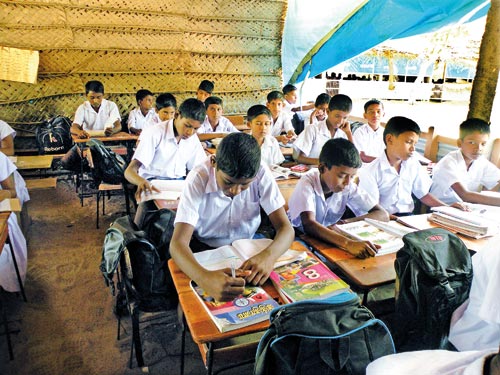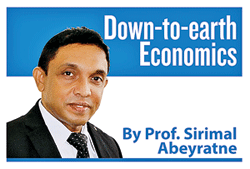Economics of opinions and feelings
View(s):
A classroom. Various groups are urging an increase in education spending by the government.
Senarath (not his real name) is spending his retirement, perhaps intermittently attending his family affairs, including those of his children and grandchildren. Although he is known to me for about 40 years, we haven’t met since the time he graduated and left the university.
A few days ago, we were both happy to see each other after so long, when we suddenly and unexpectedly met at a social gathering. We took some time there to sit down and recall our university life. We discussed about ourselves as well as our friends whom we had also missed for a long time.
In fact, many of them are retired now just like Senarath, after working at various capacities in different places but mostly in the public sector. For some reasons, as we have discussed in the past in this column, historically many graduates find their job opportunities in the public sector. Senarath’s retirement was about a year before the Sri Lankan economy was hit by COVID-19 in 2020 which was followed by the economic crisis of the country.
Cruelty of the crisis
After hearing about his retirement just before the crisis time, I thought of how it was the ‘retired’ and the ‘elderly’ generation of the population who must face the permanent loss from the current crisis. It is the nature of crises; everyone else of the population, before reaching the retirement age or elderly age has enough time to recover and adjust their incomes. But the retired and the elderly don’t have that time so that whatever they lost is lost forever!
Within a short period of time, average Sri Lankans have lost more than half of their real incomes due to the crisis impact. In other words, for a given amount of money that we spend, we can buy only less than half of what we bought those days.
Perhaps, we may have false expectations for average prices to go down or in other words, the inflation rate to fall below zero, which is called deflation. But it is highly unlikely as of now, particularly for a crisis-ridden developing country like Sri Lanka. Besides, deflationary tendencies in some countries, including China these days, are not a healthy sign of an economic progress.
From a macroeconomic point of view, deflation is worse than inflation. Deflation reflects subdued aggregate demand due to postponement of spending decisions by the public, which would retard economic progress.
 However, if the prices are unlikely to fall, then the people’s losses from the economic crisis should be recovered from income growth, which depends on more investment, more production, and more employment. This means that people in a crisis-ridden country will improve their incomes and get their living standards adjusted only in the long-term. It may be shortened to about 5 – 10 years’ time, if the economy is back on track for a fast recovery and growth.
However, if the prices are unlikely to fall, then the people’s losses from the economic crisis should be recovered from income growth, which depends on more investment, more production, and more employment. This means that people in a crisis-ridden country will improve their incomes and get their living standards adjusted only in the long-term. It may be shortened to about 5 – 10 years’ time, if the economy is back on track for a fast recovery and growth.
Elderly don’t recover
Accordingly, part of the pension that the retired people receive and part of the savings on which the elderly live got wiped out, but the retired and the elderly people don’t recover. They don’t intend to go back to work, and their money does not grow with economic recovery. Because of this, what they have lost is
lost forever.
Senarath is also a member of this retired generation. What he explained to me next, anticipating my help as well, further confirmed this.
After explaining about the new hardship that he must face even as a middle-class retiree, the real value of his pension has deteriorated during the past few years after the retirement. Then he revealed the promise of the government authorities in 2018 to give a significant salary increase for their employment category in stages during a five-year term.
As many other impractical promises of the authorities, a few hundred thousands of employees of the same category never got it. Besides that, every year after 2018 was marked by a series of bad events that ultimately contributed to the collapse of the Sri Lankan economy. Senarath had already calculated how much he would have added to his pension, if this salary increase was given.
Question without answers
Then he asked my help: “Are you in a position to talk to the authorities about this? We have met them a few times, and if you or someone else can remind them again, there can be a relief for us”.
On such an occasion, I didn’t want to give him a negative answer, but I also asked him a question: “If I or somebody else took this message to the authorities and remind them to increase your past salaries as promised, definitely they will have another question for us. Therefore, first I will ask that question from you.”
He became curious:
“What’s that?”
I replied: “They will ask me to suggest as to how the government should find money for this.”
I explained it further: “Should we tell them that taxes have to be increased more?”
He replied: “How can we increase taxes anymore? VAT was already increased from 15 to 18 per cent”.
I asked again: “Then, how about borrowing more money or printing more money? Anyway, the budget has already increased borrowings; and the money printing is already cut down. In fact, it is because of borrowings and money printing that we are in this pit today; we need to forget those proposals.”
Then he brought a strange proposal which annoyed me: “Now there are more remittances coming into the country; don’t you think so? And tourists are coming too!”
I gave him a surprise look and said: “What? How do you suggest grabbing their money and increasing your salaries and pensions? Should we rob them?”
I would not be surprised, if such comments were made by an uneducated person. Anyway, education and intellectuality are too different things. The education problem is some countries is not about the levels of education but making use of that education for critical thinking.
6 per cent on education
A few years ago, there were public protests in Sri Lanka guided by the so-called “educated” groups urging the government to raise spending on education to 6 per cent of GDP. It looks as if there is the balance, 94 per cent of GDP was still available for all other government expenditure, after allocating just 6 per cent of GDP on education!
I am not sure whether anyone who joined that public protest knew that at the time government’s total revenue was no more than 12 per cent of GDP. This means that the demand was simply for half of the government revenue should be made available for education.
In fact, there are countries in the world which allocate more than 6 per cent of GDP on education. In this respect, the Scandinavian countries and some Western European countries are famous for their higher education expenditure as well as their higher quality of education for all children. However, all these countries also maintain government revenue at over 40 per cent of GDP.
The point is that we cannot maintain a Scandinavian education system with just 12 per cent of GDP as the government revenue; we must be ready to increase our taxes too in order to ask for more spending from the government. Even if the government raises education spending, it does not produce any qualitative improvement in education without continuous reforms in the sector.
Opinions, feelings and jokes
Simple economics and arithmetic numbers that explain such economics matter for everybody to understand how this system works. Without a sense of that understanding, not only would the people follow opinions and feelings, but also the politicians mislead them. After all, it is the people who choose them.
Next time, before choosing them as the leaders of the nation, we need to be cautious about which politicians talk about sensible economics rather than opinions, feelings and jokes. Economics is simple, but it is based on principles and not on opinions. Whom we choose will surely determine our life and the lives of generations.
(The writer is a former Professor of Economics at the University of Colombo and can be reached at sirimal@econ.cmb.ac.lk and follow on Twitter @SirimalAshoka).
Hitad.lk has you covered with quality used or brand new cars for sale that are budget friendly yet reliable! Now is the time to sell your old ride for something more attractive to today's modern automotive market demands. Browse through our selection of affordable options now on Hitad.lk before deciding on what will work best for you!


